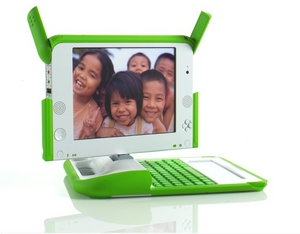Das OLPC-Wiki
| Übersetzung von The OLPC Wiki | Original |
| english | عربي | پښتو | български | deutsch | español | français | kreyòl ayisyen | italiano | 日本語 | 한국어 | монгол | Bahasa Melayu | नेपाली | norsk | português | română | русский | kinyarwanda | türkçe | 中文 | 繁體中文 +/- | Änderungen |
- This is an on-going translation
Hinweis: Dies ist keine offizielle Seite von "One Laptop per Child". Die Übersetzung erfolgte von der englischen Originalseite und ist durch Zusammenarbeit vieler Wiki-User entstanden.
Willkommen auf dem OLPC-Wiki, Quelle gemeinsam erstellter Informationen über das Projekt One Laptop per Child und seiner benachbarten Projekte und Communities. Derzeit enthält das Wiki 9,909 Seiten und über eintausend registrierte Nutzer; Mache einfach mit und teile mit uns Deine Ideen!
Neues
- Neueste Veröffentlichung: Eine noch neuere stabile Version, Build 385, zusammen mit einer neuen Firmware, Q2B87, ist jetzt verfügbar. Bitte update Deine Maschine. Du wirst in fast jeder Systemfunktion Verbesserungen finden (siehe auch Veröffentlichungshinweise).
- Lokalisierung: Jetzt ist die spanische Übersetzung auf www.laptop.org online, dank der unermüdlichen Bemühungen von Xavier Alvarez. Die Templates, um weitere Sprachen hinzuzufügen, befinden sich unter Localization/www.laptop.org. Ebenso ist die Übersetzung in vereinfachtes Chinesisch online, dank Paulo Drummond, sowie die koreanische Übersetzung dank Do Young-Min, 도 영민.
- B2 machines are being distributed to developers who have joined the Developers Program. Those without machines can still run emulators on their current computers. If you have a machine, please see the BTest-2 Release Notes and B1 and B2 Demo Notes. B1 Release Notes can still be found here.
- The specification for our security platform, Bitfrost, has been released. Comments invited.
- OLPC wins Popular Science's Best of What's New 2006. The One Laptop per Child (OLPC) website has a new look, thanks to the efforts of Nurun and Pentagram.
- Rwanda commits to the "One Laptop per Child" initiative. Uruguay also announced its participation in the OLPC project. Previously, IDB and OLPC formalized an agreement aimed at support mainstreaming of new approaches to digital technology in Latin American and Caribbean education.
Weekly updates can be found in Current events.
About One Laptop per Child
- It's an education project, not a laptop project.
This is the wiki for the One Laptop per Child association. The mission of this non-profit association is to develop a low-cost laptop—the "$100 Laptop"—a technology that could revolutionize how we educate the world's children. Our goal is to provide children around the world with new opportunities to explore, experiment, and express themselves.
Why do children in developing nations need laptops? Laptops are both a window and a tool: a window into the world and a tool with which to think. They are a wonderful way for all children to learn learning through independent interaction and exploration.
OLPC espouses five core principles: (1) child ownership; (2) low ages; (3) saturation; (4) connection; and (5) free and open source.
More on the Laptop (pt) (es) and OLPC's vision for learning (pt) (es).
What you'll find inside
A good place to start exploring this wiki is the One Laptop per Child page, which gives an overview of the project. There is a list of frequently asked questions (FAQ); a place to ask a question; and numerous pages on hardware, software, content, and the developers program—and a separate wiki for software development. Sugar is a novel interface with its own interface guidelines. There are also discussion pages on issues of deployment and country-specific discussions. An extended table of contents is also available. The latest build is always available here. The latest stable build is always available here.
About this wiki
The purpose of this wiki is to both share information about the project and to solicit ideas and feedback. The articles and discussion vary from technical to epistemological. We invite comments on every page (please use the "discussion" tab at the top of each page). Please restrict edits to the article pages themselves to facts, not opinions. You are encouraged to sign your work and to make liberal use of citations and links. (Please make an account and please use ~~~~ as a signature for your comments.) Please note that pages that include the {{OLPC}} template—such as this one—are maintained by the OLPC team and are generally representative of the current state of the project. Other pages—created and maintained by the public—should be read with that in mind.
